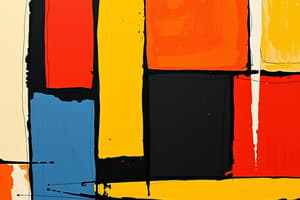Podcast
Questions and Answers
What is the primary goal of literary critics?
What is the primary goal of literary critics?
- To document historical events in literature
- To describe authors' lives in detail
- To explain the significance of certain writings (correct)
- To summarize plot points of various texts
Which activity is characteristic of literary discussion?
Which activity is characteristic of literary discussion?
- Decoding the author's biography for insights
- Analyzing the use of metaphors in poetry
- Examining the historical context of a novel
- Reflecting critically on a text while reading (correct)
What does literary analysis involve?
What does literary analysis involve?
- Comparative analysis of authors' biographies
- Summarization of entire texts
- General opinion on literature
- Close examination of literary sections (correct)
How do literary interpretations enhance understanding of a work?
How do literary interpretations enhance understanding of a work?
What do literary interpretations primarily rely on?
What do literary interpretations primarily rely on?
What is the primary concern of literary criticism?
What is the primary concern of literary criticism?
Which type of criticism emphasizes the power relations among different segments of society?
Which type of criticism emphasizes the power relations among different segments of society?
How does literary theory relate to literary criticism?
How does literary theory relate to literary criticism?
Which criticism uses the ideals of feminism to analyze literature?
Which criticism uses the ideals of feminism to analyze literature?
What is the purpose of archetypal criticism?
What is the purpose of archetypal criticism?
What is one aspect that reader-response criticism considers to understand a text?
What is one aspect that reader-response criticism considers to understand a text?
Which criticism suggests that history is largely written from a male point of view?
Which criticism suggests that history is largely written from a male point of view?
What does modern literary criticism often reflect?
What does modern literary criticism often reflect?
What does deconstruction emphasize about the meaning of literature?
What does deconstruction emphasize about the meaning of literature?
Which literary theory focuses exclusively on the form of a literary work?
Which literary theory focuses exclusively on the form of a literary work?
Psychoanalytic criticism is primarily based on which psychologist's theories?
Psychoanalytic criticism is primarily based on which psychologist's theories?
Postcolonial criticism examines literature in relation to which issues?
Postcolonial criticism examines literature in relation to which issues?
What is the primary focus of queer theory in literature?
What is the primary focus of queer theory in literature?
How do new historicists view the influence of history on literature?
How do new historicists view the influence of history on literature?
What is a key function of literary criticism?
What is a key function of literary criticism?
Which literary theory is concerned with the unconscious desires expressed in literary texts?
Which literary theory is concerned with the unconscious desires expressed in literary texts?
What is the primary responsibility of a literary critic?
What is the primary responsibility of a literary critic?
Which period is NOT mentioned as a notable period of literary criticism?
Which period is NOT mentioned as a notable period of literary criticism?
How can literary criticism aid in personal reading experiences?
How can literary criticism aid in personal reading experiences?
What does the term 'canon' refer to in literary criticism?
What does the term 'canon' refer to in literary criticism?
Why is understanding the type of literary criticism important?
Why is understanding the type of literary criticism important?
Which activity is NOT part of literary criticism?
Which activity is NOT part of literary criticism?
What can literary criticism help readers understand about books?
What can literary criticism help readers understand about books?
What is a benefit of reading literary criticism for pleasure?
What is a benefit of reading literary criticism for pleasure?
Flashcards are hidden until you start studying
Study Notes
Definition and Purpose of Literary Criticism
- Literary criticism involves the study, evaluation, and interpretation of literature.
- It is influenced by literary theory, the philosophical discourse on literature's objectives and methods.
- The purpose is to establish judgments, analyze concepts, and assess the impact of literary works on readers.
Key Aspects of Literary Criticism
- The term "literary" refers to literature's writing, study, and content valued for its quality.
- "Criticism" includes both disapproval and analysis of literary works’ merits and faults.
- Criticism aims to improve critical thinking skills and deepen understanding of texts.
Types of Literary Theories
- Archetypal Criticism: Focuses on recurring themes and archetypes across literature.
- Feminist Criticism: Analyzes literature through the lens of feminism, emphasizing a patriarchal perspective.
- Marxist Criticism: Examines class and socioeconomic conditions in literature.
- Reader-Response Criticism: Focuses on readers' interpretation and meaning-making processes.
- Deconstruction: Highlights the instability of meaning in literature due to language's ever-changing nature.
- Formalism: Analyzes literature's form, independent of context and historical background.
- Psychoanalytic Criticism: Investigates texts as reflections of the author's subconscious and psychological issues.
- Postcolonial Criticism: Explores literature in the context of colonial power dynamics.
- Queer Theory: Challenges traditional representations of gender and sexuality in literature.
- New Historicism: Connects literature with the historical context of both the author and the critic.
Importance of Literary Theories
- Different theories provide diverse perspectives for understanding literature.
- Each theory serves as a starting point for interpretation rather than a definitive answer.
Literary Critic’s Role
- A literary critic examines and evaluates literary works using literary theories.
- The role entails discerning and classifying literature for accurate discussions and criticisms.
Reading Literary Criticism
- Understanding whether criticism is analytical or subjective helps engage with it effectively.
- Recognizing the required background information aids in comprehending arguments and interpretations.
Distinction between Literary Discussion, Analysis, and Interpretation
- Literary Discussion: Encourages critical thinking through dialogues about texts.
- Literary Analysis: Involves a close examination of literary elements for deeper comprehension.
- Literary Interpretation: Broader understanding of texts that emphasizes meaning and textual analysis.
Historical Context of Literary Criticism
- Notable periods include the Medieval Period, Renaissance, Neoclassicism, Romanticism, and the 20th Century.
Overall Functions of Literary Criticism
- Encompasses a range of activities from book reviews to theoretical discussions on literature and relevant historical contexts.
Studying That Suits You
Use AI to generate personalized quizzes and flashcards to suit your learning preferences.




